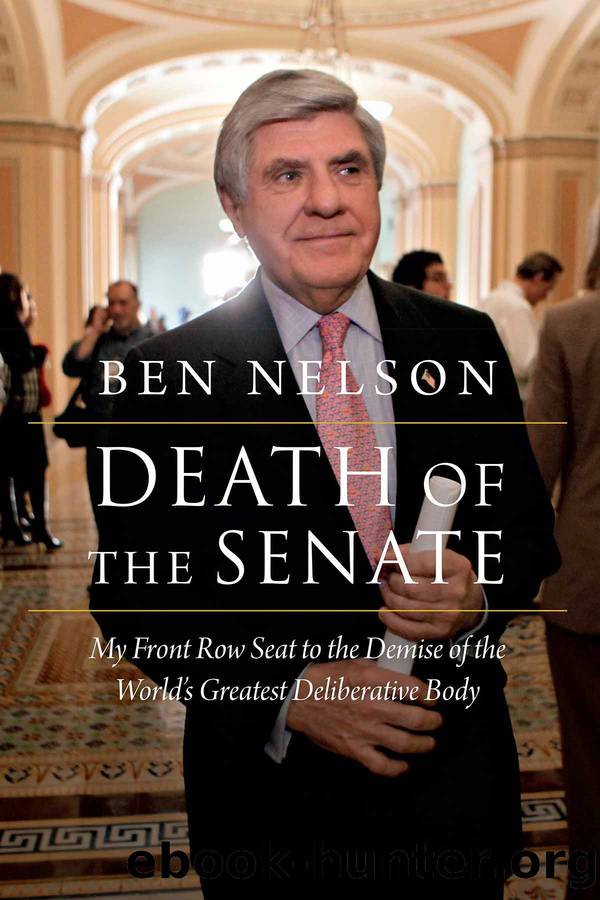Death of the Senate: My Front Row Seat to the Demise of the World's Greatest Deliberative Body by Ben Nelson

Author:Ben Nelson [Nelson, Ben]
Language: eng
Format: epub
Tags: Biography & Autobiography, Political, Political Science, American Government, Legislative Branch
ISBN: 9781640124943
Google: LmI7EAAAQBAJ
Goodreads: 57527326
Publisher: Potomac Books
Published: 2021-09-01T00:00:00+00:00
* * *
Sadly, our Gang of 14 deal didnât hold. Once most of its signers retired, were defeated or passed away, talk returned about ending the filibuster. In 2013 Harry Reid, now serving as Senate majority leader, used the nuclear option to do away with the sixty-vote rule on executive branch nominations and federal judicial appointments, but not for the Supreme Court. Then in 2017, after Republicans gained the majority in the Senate, Republican leader Mitch McConnell used the nuclear option to end the sixty-vote cloture rule for Supreme Court nominees. That enabled him to end debate on the Trump nominee Neil Gorsuch, greasing his path to a seat on the Supreme Court. And that led to Brett Kavanaughâs nomination debacle.
That was a sad day for our country. Not because of my views about Gorsuchâs fitness to serve on the high court, or about McConnellâs underhanded tactics in blocking Judge Merrick Garlandâs nomination in 2016 under the Obama administration, which he later boasted was the âmost consequential thing Iâve ever done.â It was sad because the Senate had abandoned its constitutional responsibility to provide checks and balances to the political and partisan whims of the executive branch. Those two actions would have far-reaching and negative consequences.
Back to Brett Kavanaugh and to 2006. After the Gang deal averted the nuclear option, the Bush White House renominated Kavanaugh in February 2006 for the judicial seat on the D.C. Court of Appeals. Republicans praised him, Democrats considered filibustering him, and his confirmation hearings were contentious. By the early spring, a number of Bush judicial nominees were stuck in the pipeline, though we had confirmed John Roberts and Samuel Alito to the Supreme Court.
The hallways of the marble-floored Capitol were buzzing with talk again of invoking the ânuclear optionâ to blow up potential filibusters. On May 3, 2006, the seven senators, myself included, who made up the Democratic side of the Gang of 14 sent a letter to Senate leaders asking for the Judiciary Committee to hold a new confirmation hearing on new issues which had arisen since his initial hearing was held two years earlier. âPerhaps Mr. Kavanaugh would appreciate the opportunity of another hearing to clarify his role, or lack thereof, in issues viewed by some as controversial, such as the White House-approved policy of wiretapping,â we wrote. This was a hot issue at the time.
The Judiciary Committee held that confirmation hearing on May 9, during which Kavanaugh was asked about his role as staff secretary in the Bush White House. He denied having any role in a series of White House controversies, saying he wasnât part of deliberations over domestic spying; never met with controversial lobbyist Jack Abramoff; knew nothing about the shocking public disclosure of Valerie (Plame) Wilson as a Central Intelligence Agency spy; nor ever saw the torture memos, the administrationâs legal memos used to justify abusive interrogation of suspected terrorists.
Our whole Gang of 14 regrouped in my offices the evening of May 10. The Democratic group wasnât pleased
Download
This site does not store any files on its server. We only index and link to content provided by other sites. Please contact the content providers to delete copyright contents if any and email us, we'll remove relevant links or contents immediately.
The Secret History by Donna Tartt(19058)
The Social Justice Warrior Handbook by Lisa De Pasquale(12187)
Thirteen Reasons Why by Jay Asher(8894)
This Is How You Lose Her by Junot Diaz(6877)
Weapons of Math Destruction by Cathy O'Neil(6267)
Zero to One by Peter Thiel(5789)
Beartown by Fredrik Backman(5737)
The Myth of the Strong Leader by Archie Brown(5500)
The Fire Next Time by James Baldwin(5432)
How Democracies Die by Steven Levitsky & Daniel Ziblatt(5216)
Promise Me, Dad by Joe Biden(5144)
Stone's Rules by Roger Stone(5081)
A Higher Loyalty: Truth, Lies, and Leadership by James Comey(4954)
100 Deadly Skills by Clint Emerson(4921)
Rise and Kill First by Ronen Bergman(4780)
Secrecy World by Jake Bernstein(4742)
The David Icke Guide to the Global Conspiracy (and how to end it) by David Icke(4709)
The Farm by Tom Rob Smith(4502)
The Doomsday Machine by Daniel Ellsberg(4485)
